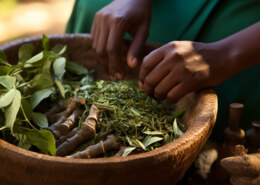For centuries, African communities have relied on local herbs not just for cooking but also for healing, energy, and general well-being. These plants were — and still are — woven into daily life: from the hibiscus drinks served during celebrations to bitterleaf teas brewed for digestive health.
Today, these traditional African herbs are stepping into the global spotlight. Health-conscious families, chefs, and wellness brands are rediscovering their benefits and integrating them into smoothies, snacks, skincare, and supplements.
For parents seeking natural, nutrient-rich options for their families, these herbs offer both heritage and health.
1. Moringa: The “Miracle Tree”
Moringa leaves have been part of African cooking for generations, especially in soups and porridges for postpartum mothers and children.
Nutritional highlights:
-
Rich in vitamins A, C, and E, iron, and calcium
-
Contains all nine essential amino acids
-
High in antioxidants that fight inflammation
Modern uses:
Moringa is now a popular “superfood powder” added to smoothies, energy bars, teas, and even baby-friendly porridge blends.
✅ Why parents love it: Supports energy levels, strengthens immunity, and aids in growth and development.
2. Hibiscus (Zobo/Roselle)
In many African homes, dried hibiscus petals are used to make zobo drink — a tart, ruby-red beverage often flavored with ginger, pineapple, or cloves.
Health benefits:
-
Naturally rich in vitamin C for immune support
-
Helps regulate blood pressure
-
Packed with antioxidants for heart health
Modern uses:
Hibiscus is trending in herbal teas, kombucha, syrups, and even skincare products thanks to its vibrant color and antioxidant properties.
✅ Parenting tip: Hibiscus tea (unsweetened) can be served chilled as a vitamin-rich alternative to sugary juices for kids over 2 years old.
3. Baobab Fruit Powder
Nicknamed the “tree of life,” baobab fruit pulp has long been used in Africa to make refreshing drinks and boost nutrition.
Nutritional highlights:
-
Exceptionally high in vitamin C — even more than oranges
-
A natural source of prebiotic fiber for gut health
-
Contains calcium, magnesium, and potassium
Modern uses:
Today, baobab is celebrated as a gut-friendly superfood and is often added to yogurt, oatmeal, smoothies, or energy balls.
✅ Why families love it: The tangy flavor is kid-approved and supports digestion, immunity, and energy.
4. Bitterleaf (Vernonia amygdalina)
A staple in soups such as Ofe Onugbu, bitterleaf is traditionally valued for its medicinal properties.
Health benefits:
-
Helps cleanse the digestive system
-
May help regulate blood sugar levels
-
Contains compounds that support liver and gut health
Modern uses:
While still a classic ingredient in Nigerian cuisine, bitterleaf extracts are now being used in herbal teas and wellness supplements.
✅ Parenting tip: Bitterleaf soup can be prepared in milder versions for family-friendly meals that promote good digestion.
5. Rooibos (African Red Bush Tea)
Originally from Southern Africa, rooibos tea has gained worldwide fame as a naturally caffeine-free beverage.
Health benefits:
-
Rich in antioxidants that support heart health
-
Gentle and safe for kids (no caffeine)
-
May help improve sleep quality
Modern uses:
Rooibos is now a popular alternative to black or green tea and is often blended into lattes, iced teas, and baby-safe tea blends.
✅ Why parents love it: Its naturally sweet, nutty taste makes it an excellent bedtime tea for the whole family.
6. African Ginger and Turmeric
Ginger and turmeric have always been kitchen staples in African cooking — and both are now trending globally as wellness powerhouses.
Health benefits:
-
Ginger supports digestion and relieves nausea
-
Turmeric contains curcumin, which helps fight inflammation
-
Both have immune-boosting properties
Modern uses:
From ginger shots to golden turmeric lattes, these roots are now common in modern health drinks, soups, and even baby-friendly soups for colds.
✅ Parenting tip: Add fresh ginger to kids’ homemade teas during flu season for soothing relief.
Why African Herbs Are Gaining Global Attention
-
Heritage Meets Science: Modern research is confirming what traditional healers have known for centuries about their health benefits.
-
Sustainability: Many African herbs grow naturally and are drought-resistant, making them eco-friendly.
-
Culinary Versatility: These herbs blend well with both African dishes and international recipes like smoothies, teas, and baked goods.
Tips for Parents Introducing African Herbs at Home
-
Start Slowly: Introduce herbs in small amounts to ensure kids adjust to the flavors.
-
Pair with Familiar Foods: Add moringa to smoothies or soups, hibiscus to homemade drinks, and baobab to yogurt for a sweet-tangy twist.
-
Check for Allergies: Consult a pediatrician before introducing new herbs to toddlers or babies.
-
Buy Quality Products: Choose fresh herbs or reputable packaged powders and teas.
Final Thoughts: A Taste of Tradition, a Step Toward Wellness
African herbs are more than ingredients; they’re part of a rich cultural heritage that’s finally getting the global recognition it deserves. For parents, they offer natural, nutrient-packed alternatives to overly processed foods — and a way to pass down traditional flavors to the next generation.
By embracing these herbs, families can enjoy the best of both world

